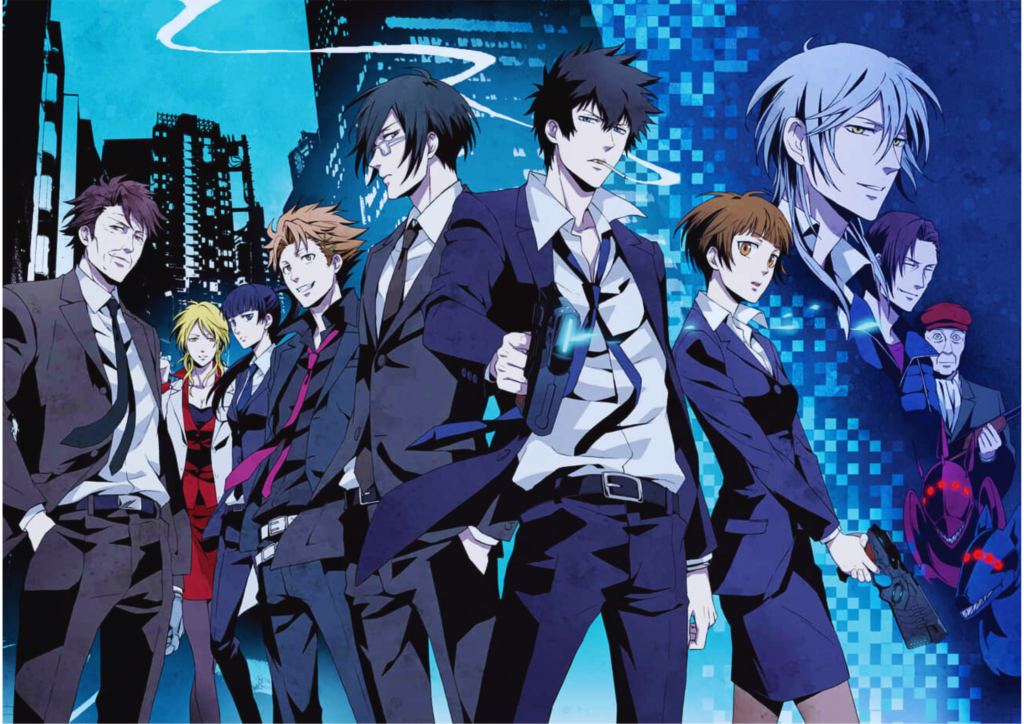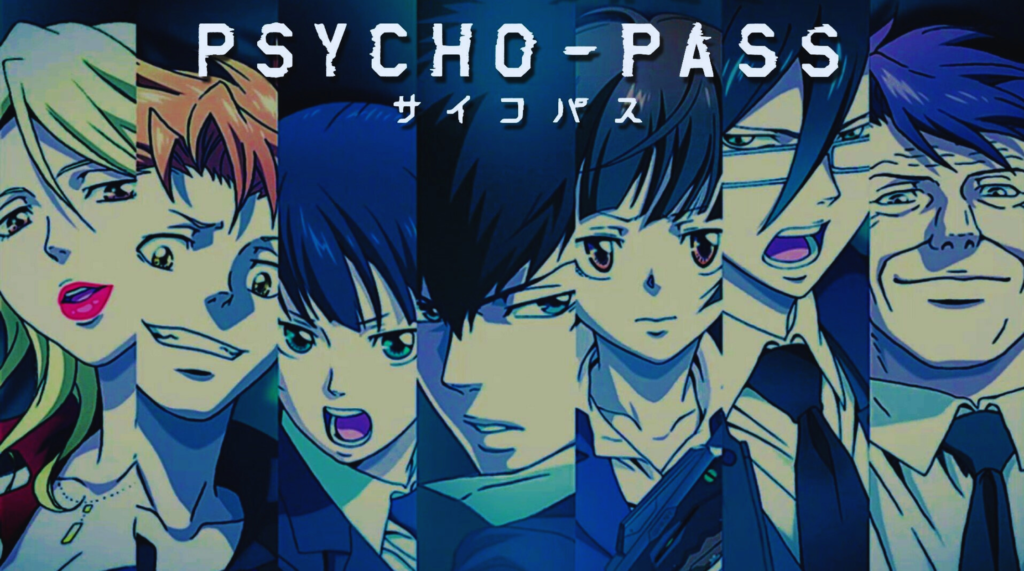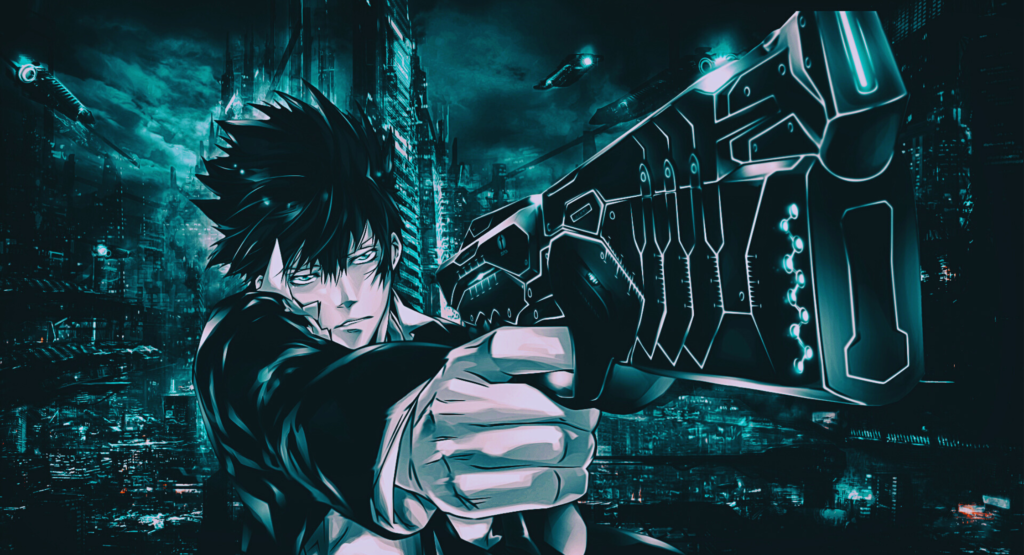Introduction
The anime “Psycho-Pass,” produced by Production I.G and directed by Naoyoshi Shiotani with original concept by Gen Urobuchi, is a thrilling cyberpunk series that delves into the complexities of a dystopian future where society is governed by a powerful surveillance system. Set in the year 2113, “Psycho-Pass” presents a world where the mental states of citizens are constantly monitored to maintain public order, exploring themes of morality, justice, and the human condition. This blog will provide a comprehensive analysis of the anime, including its plot, characters, themes, and its impact on the anime industry and popular culture.

Plot Overview (Psycho-Pass)
“Psycho-Pass” is set in a future where the Sibyl System, an omnipresent and all-knowing artificial intelligence, dictates the quality of life for citizens. The system measures individuals’ mental states, personalities, and the likelihood of committing crimes using a Psycho-Pass, a numeric value known as the Crime Coefficient. Those with high Crime Coefficients are either rehabilitated or eliminated to prevent criminal activities, ensuring a peaceful society.
The series follows Akane Tsunemori, a new Inspector in the Public Safety Bureau’s Criminal Investigation Division. As an Inspector, her duty is to manage Enforcers, latent criminals used by the Bureau to hunt down active criminals. Among the Enforcers is Shinya Kogami, a former Inspector who was demoted due to his high Crime Coefficient. Akane and Kogami navigate through a series of complex cases that challenge their understanding of morality, justice, and the true nature of the Sibyl System.

Main Characters
Akane Tsunemori
- Akane starts as an idealistic and morally upright rookie Inspector. Her journey through the series sees her grappling with the ethical implications of the Sibyl System and her role within it. Her character development is significant, transforming from a naive newcomer to a seasoned and critical thinker who questions the very foundation of the system she serves.
Shinya Kogami
- Kogami is an Enforcer with a dark past and a personal vendetta against Shogo Makishima, the primary antagonist. His experiences and insights into the flaws of the Sibyl System make him a complex character driven by a sense of justice that often conflicts with the system’s rules.
Shogo Makishima
- Makishima is a charismatic and intellectual villain who opposes the Sibyl System’s control over society. He believes in human free will and the natural chaos that comes with it. His ability to avoid detection by the Sibyl System due to his unique psychological profile makes him a formidable and thought-provoking antagonist.
Nobuchika Ginoza
- Ginoza is Akane’s senior Inspector who initially upholds the Sibyl System’s values without question. His character arc involves a personal struggle as he witnesses the system’s failures and the impact it has on those around him, especially the Enforcers who were once his colleagues.
Tomomi Masaoka
- Masaoka, a seasoned Enforcer and Ginoza’s father, provides a grounded perspective on the realities of working under the Sibyl System. His wisdom and experience highlight the generational and ideological divides within the Public Safety Bureau.
Themes and Philosophical Underpinnings (Psycho-Pass)
Morality and Justice
- “Psycho-Pass” poses fundamental questions about morality and justice in a highly controlled society. It challenges viewers to consider whether a society that sacrifices individual freedoms for the sake of public safety can truly be just. The characters’ differing perspectives on justice provide a rich tapestry of philosophical debate, making viewers ponder the ethical boundaries of law enforcement and governance.
Free Will vs. Determinism
- The conflict between free will and determinism is central to the series. The Sibyl System represents a deterministic view of society, where individuals’ futures are predicted and controlled to maintain order. In contrast, characters like Makishima advocate for free will, embracing the unpredictability and chaos that come with it. This dichotomy drives the narrative and character motivations, exploring the implications of a society where freedom is limited by technology.
Surveillance and Privacy
- “Psycho-Pass” critically examines the role of surveillance in modern society. The omnipresent Sibyl System monitors every aspect of citizens’ lives, raising questions about privacy and the extent to which individuals should be watched for the sake of security. The anime’s portrayal of a surveillance state serves as a cautionary tale about the potential dangers of sacrificing privacy for safety.
Human Nature
- The series delves into the darker aspects of human nature, exploring themes such as violence, corruption, and the capacity for change. The characters’ interactions with the Sibyl System reveal the complexities of human psychology and the moral ambiguities that arise when technology attempts to categorize and control human behavior.
Impact and Reception
Since its debut in 2012, “Psycho-Pass” has garnered critical acclaim for its thought-provoking narrative, complex characters, and philosophical depth. It has been praised for its sophisticated storytelling and its ability to tackle contemporary issues through the lens of a dystopian future. The anime’s blend of cyberpunk aesthetics and psychological intrigue has made it a standout series in the genre.
The success of “Psycho-Pass” led to multiple seasons, movies, and spin-offs, each expanding on the original premise while introducing new characters and scenarios. The franchise’s popularity extends beyond Japan, with a significant international fanbase appreciating its exploration of universal themes.

Visual and Auditory Excellence
Animation
- Produced by Production I.G, “Psycho-Pass” boasts high-quality animation that brings its cyberpunk world to life. The detailed backgrounds, character designs, and fluid action sequences contribute to the immersive experience. The visual representation of the Sibyl System and its technology is particularly noteworthy, enhancing the futuristic and dystopian atmosphere of the series.
Soundtrack
- The music of “Psycho-Pass,” composed by Yugo Kanno, perfectly complements the series’ tone. The soundtrack ranges from hauntingly beautiful melodies to intense, adrenaline-pumping tracks that heighten the emotional impact of key scenes. The opening and ending themes, performed by popular artists, further enrich the viewing experience.
Voice Acting
- The voice acting in “Psycho-Pass” is stellar, with notable performances from the cast that bring depth to their characters. Kana Hanazawa as Akane Tsunemori, Tomokazu Seki as Shinya Kogami, and Takahiro Sakurai as Shogo Makishima deliver compelling performances that capture the nuances of their roles.
Cultural and Philosophical Influence (Psycho-Pass Season 1)
“Psycho-Pass” draws inspiration from various cultural and philosophical sources, enriching its narrative complexity. The series references works of literature, philosophy, and psychology, including the writings of George Orwell, Philip K. Dick, and Michel Foucault. These references underscore the anime’s exploration of themes such as surveillance, totalitarianism, and the human psyche.
The concept of the Sibyl System can be seen as a critique of utilitarianism, where the greatest good for the greatest number is achieved at the expense of individual freedoms. The series also explores the ideas of social contract theory, questioning the legitimacy of a government that prioritizes control over personal liberty.
Manga Speculation
As “Psycho-Pass” continues to expand its narrative universe through its manga adaptations, speculations about future plot developments and character arcs are rife among fans. One of the most anticipated directions involves further exploration of the origins and inner workings of the Sibyl System. The manga could delve deeper into the backstories of key characters who were integral to the creation and maintenance of this surveillance regime. This would not only provide more context to the existing storyline but also introduce new layers of ethical and philosophical dilemmas.
Moreover, fans speculate that we might see new forms of resistance against the Sibyl System, possibly from unexpected alliances or even insiders who become disillusioned with the system’s oppressive nature. This could pave the way for a more intense and multifaceted conflict, challenging the very foundation of the dystopian order.
Another intriguing speculation is the potential development of Akane Tsunemori’s character as she continues to grapple with the moral complexities of her role. The manga could explore her transformation from an enforcer of the system to a more radical figure questioning and potentially opposing the Sibyl System’s authority. This evolution could be catalyzed by new revelations about the system’s flaws and injustices, as well as personal losses or betrayals. Additionally, the reappearance of Shinya Kogami and his possible collaboration or clash with Akane could add a dynamic twist to the narrative.
As Akane’s convictions are tested, the manga might delve into her internal struggles and strategic maneuvers to navigate and perhaps dismantle the pervasive control of the Sibyl System. These developments would not only enrich her character arc but also elevate the series’ exploration of autonomy, justice, and human resilience.
Conclusion
“Psycho-Pass” stands as a landmark in the anime landscape, offering a profound and thought-provoking exploration of a dystopian future where technology governs society. Its rich narrative, complex characters, and philosophical depth make it a compelling watch for anyone interested in the intersection of ethics, technology, and human nature.
The series’ impact on popular culture and its continued relevance in discussions about surveillance, privacy, and morality highlight its significance as more than just an anime—it is a profound commentary on contemporary societal issues. Whether you are a longtime fan or new to the world of “Psycho-Pass,” the series promises a captivating journey that will leave you questioning the very fabric of modern civilization.
As we continue to advance technologically, “Psycho-Pass” serves as a reminder to consider the ethical implications of our innovations. It challenges us to reflect on the balance between security and freedom, order and chaos, and the true essence of justice in an increasingly monitored world.
If you enjoyed “Psycho-Pass,” you might find the following anime series similarly engaging due to their themes of dystopian societies, psychological depth, and ethical dilemmas:
- “Ghost in the Shell: Stand Alone Complex”
- Premise: Set in a futuristic world where cybernetic enhancements are common, the series follows Major Motoko Kusanagi and her team in Section 9 as they tackle cyber-crimes and terrorism. It delves deep into themes of identity, consciousness, and the impact of technology on society.
- Similarities: Both series feature a cyberpunk setting, advanced surveillance technology, and a focus on philosophical and ethical questions about society and humanity.
- “Ergo Proxy”
- Premise: In a post-apocalyptic world, humans and androids (AutoReivs) coexist in a domed city controlled by a centralized government. The story follows Re-l Mayer as she investigates a series of mysterious events involving rogue AutoReivs and a powerful entity known as Proxy.
- Similarities: Like “Psycho-Pass,” “Ergo Proxy” combines psychological and philosophical elements with a dystopian setting, exploring themes of control, identity, and the human psyche.
- “Death Note”
- Premise: High school student Light Yagami discovers a mysterious notebook that grants him the power to kill anyone whose name he writes in it. As he attempts to create a utopia free of crime, he is pursued by the brilliant detective L.
- Similarities: Both series involve a cat-and-mouse game between law enforcement and a central figure challenging the system, with deep moral and ethical questions about justice and the nature of power.
- “Akira”
- Premise: In a post-apocalyptic Neo-Tokyo, biker gang member Kaneda discovers that his friend Tetsuo has developed powerful psychic abilities after a government experiment. As Tetsuo’s powers grow out of control, Kaneda and others must stop him.
- Similarities: “Akira” shares a dystopian future setting with “Psycho-Pass,” with themes of government control, the consequences of unchecked power, and societal collapse.
- “Paranoia Agent”
- Premise: The series follows a series of mysterious attacks by a figure known as “Lil’ Slugger” in Tokyo. As detectives investigate, they uncover deeper societal issues and psychological breakdowns among the victims and the wider population.
- Similarities: “Paranoia Agent” explores psychological themes, societal pressures, and the effects of fear and paranoia, much like “Psycho-Pass,” with a narrative that questions reality and the nature of sanity.
Here are 10 frequently asked questions (FAQs) about the anime “Psycho-Pass”:
- What is “Psycho-Pass” about?
- “Psycho-Pass” is set in a dystopian future where the Sibyl System, a powerful AI, monitors citizens’ mental states to maintain public order. The story follows Akane Tsunemori, an Inspector in the Public Safety Bureau, as she navigates complex moral and ethical dilemmas while enforcing the law.
- Who created “Psycho-Pass”?
- “Psycho-Pass” was created by Gen Urobuchi, who is known for his work on other popular series such as “Puella Magi Madoka Magica.” The anime was produced by Production I.G and directed by Naoyoshi Shiotani.
- What is the Sibyl System?
- The Sibyl System is an advanced AI that measures individuals’ psychological states and determines their likelihood of committing crimes using a numeric value called the Crime Coefficient. High Crime Coefficient individuals are deemed dangerous and are either rehabilitated or eliminated.
- Who are the main characters in “Psycho-Pass”?
- The main characters include Akane Tsunemori, Shinya Kogami, Nobuchika Ginoza, Tomomi Masaoka, and Shogo Makishima. Each character plays a crucial role in exploring the themes of justice and morality within the series.
- Is “Psycho-Pass” available in multiple seasons?
- Yes, “Psycho-Pass” has multiple seasons, movies, and spin-offs that expand on the original story. The first season premiered in 2012, followed by subsequent seasons and films that explore different aspects of the dystopian world.
- What genre does “Psycho-Pass” fall under?
- “Psycho-Pass” is primarily a science fiction and psychological thriller with strong elements of cyberpunk. It also incorporates themes of crime, mystery, and social commentary.
- What makes “Psycho-Pass” unique compared to other anime?
- “Psycho-Pass” stands out for its deep philosophical and ethical questions, complex characters, and its exploration of a surveillance state. The series delves into the implications of a society governed by an AI that monitors and controls human behavior.
- Can I watch “Psycho-Pass” on streaming platforms?
- Yes, “Psycho-Pass” is available on various streaming platforms such as Crunchyroll, Funimation, and Hulu, depending on your region. It is also available for purchase on Blu-ray and DVD.
- Is “Psycho-Pass” suitable for all audiences?
- “Psycho-Pass” is rated for mature audiences due to its violent content, psychological intensity, and complex themes. It is not recommended for younger viewers or those sensitive to graphic depictions of crime and mental distress.
- Will there be more “Psycho-Pass” content in the future?
- While the franchise has already expanded with multiple seasons, movies, and spin-offs, the possibility of future content always exists. Fans should keep an eye on official announcements for any updates regarding new “Psycho-Pass” projects.


1 thought on “Psycho-Pass Anime (2012): A Comprehensive Look at the Depths of Society”